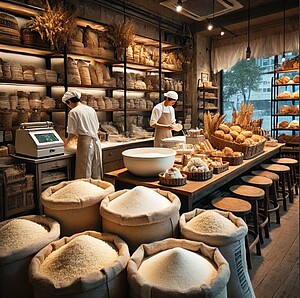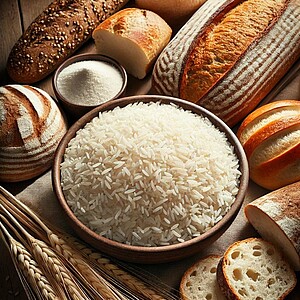Development and application of DMTA for the investigation of gluten-free networks
The production of high-quality gluten-free products presents a challenge, as the absence of gluten affects dough structure and, consequently, product quality. An innovative approach to producing gluten-free baked goods involves mimicking the gluten network using enzymatically cross-linked protein-arabinoxylan networks. Rice proteins and rice bran, for example, can be used for this purpose. This master’s thesis aims to develop and apply Dynamic Mechanical Thermal Analysis (DMTA) as a method for investigating gluten-free networks based on rice protein and arabinoxylans. Additionally, the mechanical properties of these networks under thermal conditions will be studied. The findings are expected to provide deeper insights into the viscoelastic behavior of gluten-free doughs.

Einfluss von enzymatisch induzierten Protein-AX-Netzwerken auf die Stärkeverkleisterung und thermodynamische Eigenschaften
In dieser Masterarbeit soll der Einfluss von enzymatisch induzierten Protein-Arabinoxylan-Netzwerken auf die Stärkeverkleisterung während thermischer Phasenübergänge, untersucht werden. Es soll erforscht werden, wie diese Netzwerke die Stärkeverkleisterung beeinflussen und welche Auswirkungen dies auf die Textur und Qualität der glutenfreien Produkte hat. Dafür sollen thermodynamische Eigenschaften glutenfreier Systeme, einschließlich des Anteils an ungefrorenem und gefrierbarem Wasser sowie der Stärke-Retrogradation untersucht werden.

Modeling the rheological behavior of gluten-free doughs based on rice starch and rice protein using arabinoxylans for cross-linking
Models in the food industry are used, among other things, to predict product quality and optimize processes. They describe both the interactions between system components and the processes taking place. This master’s thesis aims to develop and validate a mathematical model that describes the rheological behavior of gluten-free doughs. These doughs are based on rice starch and rice protein, with their fractions enzymatically cross-linked. The objective of this work is to create a model, based on rheological data among other factors, that captures the interactions between rice starch, rice protein, arabinoxylans, and enzymes. The insights gained are intended to provide new approaches for producing high-quality gluten-free baked goods by elucidating the effects of cross-linking strategies on the structure and stability of the doughs.

Contact Dr. Viktoria Zettel